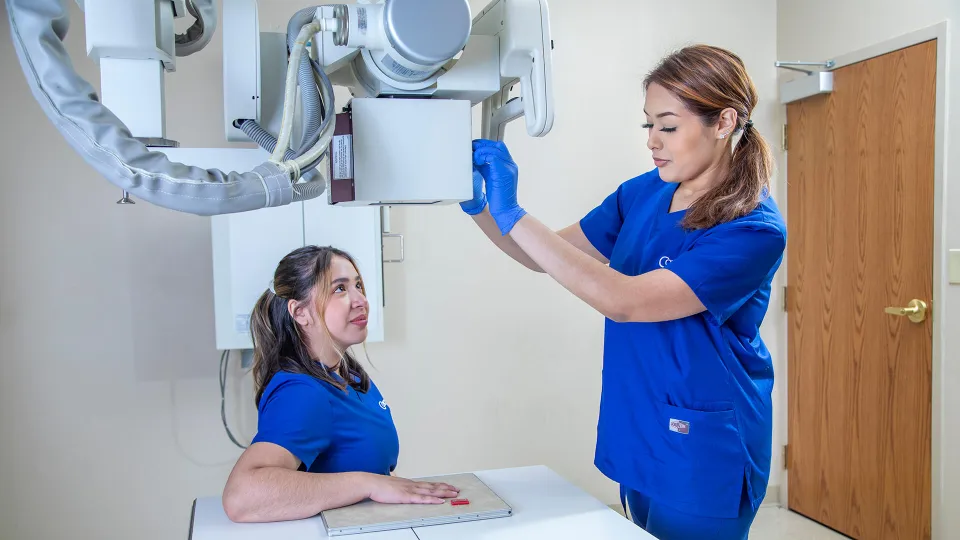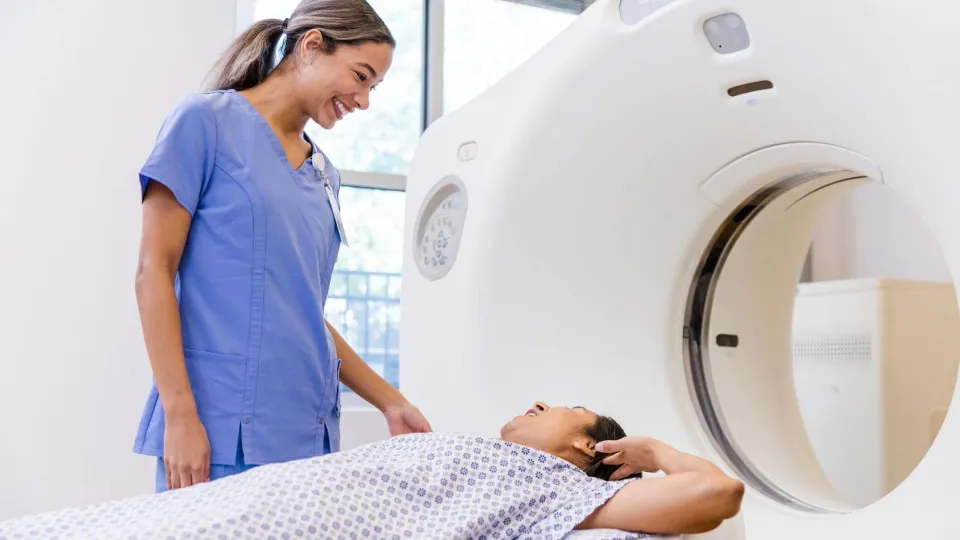
Fortune Business Insights projects the diagnostic imaging services market will grow from $130.38 billion in 2023 to $206.84 billion by 2030. As this sector expands, healthcare organizations will need more radiology specialists to take and interpret X-rays and other medical images.
The U.S. Bureau of Labor Statistics projects that jobs for radiologic and MRI technologists will grow by 6% between 2023 and 2033, which is faster than the national average. The future is also bright for radiologists, with a 5.2% increase projected for this profession. This article explores degrees in radiology that candidates may pursue to help them secure a role in this dynamic healthcare sector.
Types of Radiology Degrees
Various degrees in radiology suit different career goals, budgets, and preferences. Completing a full-time study program typically takes four years, while online programs often offer an accelerated, more flexible course of study. Here are some popular radiology degrees.
Associate Degree in Radiologic Technology
An Associate Degree in Radiologic Technology is typically a two-year program that teaches the fundamentals of radiology and some general topics, like math. An associate degree from a learning institution recognized by the American Registry of Radiological Technologists is the minimum requirement for ARRT certification and registration. As these degrees are short (when compared to bachelor's degrees), they're ideal for those who want to start working as a radiologic technologist sooner. Candidates need a high school diploma or equivalent, such as the GED certificate, to enroll. Some schools also have math and science prerequisites. Topics covered in this associate degree include:
- Medical terminology
- Cardiopulmonary resuscitation
- Anatomy and physiology
- Basic physics
- Vital sign checks
- Patient and equipment positioning
- Practical clinical experience
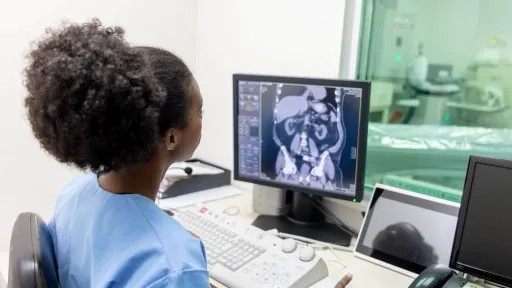
Related: What Can You Do with an Associate Degree in Radiologic Technology?
Bachelor of Science in Radiologic Technology
A Bachelor of Science in Radiologic Technology, sometimes called a Bachelor of Science in Radiologic and Imaging Sciences, is a four-year degree program that provides an in-depth knowledge of radiology and healthcare. Students can focus on an area of radiology that interests them, such as mammography or magnetic resonance imaging, to become a specialist radiologic technologist. They can also learn about leadership if they want to manage a radiology facility or department.
While a high school diploma or GED certificate is the only requirement for entry to these programs, candidates with an Associate Degree in Radiologic Technology may have an advantage when applying. Some institutions also require candidates to have a minimum grade point average and complete prerequisite math and science courses. Topics covered in a bachelor's radiology degree include:
- Medical terminology
- Anatomy and physiology
- Patient positioning
- Radiation protection
- Physics
- Pathology
- Medical imaging science
- Clinical skills
- Healthcare management
- Decision making
- Medical ethics, law, and confidentiality
- One-year externship in a radiology facility
Master's Degree in Radiologic Technology
A master's degree provides advanced education in radiology. It's typically a two-year degree completed by those who have already earned a bachelor's degree . Some schools require students to have some experience working in the radiology sector before enrolling in a master's program.
Coursework varies depending on the student's electives, which can help them prepare for careers as radiology administrators or educators. All students complete research and a thesis focused on an area of radiologic technology that interests them. A clinical internship is another common component of the master's program. During a master's radiology degree, students often learn:
- Advanced image analysis and diagnosis techniques
- Advanced human anatomy
- Clinical pharmacology
- Pathological pattern recognition
- Medical imaging technology trends
Certification and Licensure
Certification, licensure, or both are mandatory for radiologic and MRI technologists in more than three-quarters of American states. Many professionals secure certification and licensing, even when it's not required in their state, to improve their job prospects and earning potential.
Radiology graduates typically obtain certification from the ARRT or the American Registry of Magnetic Resonance Imaging Technologists, depending on their specialization. Some professionals acquire certification from both bodies. Most states that mandate certification for radiologic technologists require ARRT certification.
Both certifying bodies require candidates to agree to their codes of ethics and pass their certification examinations. Candidates renew ARRT certification yearly, while the ARMRIT certification has a three-year renewal period.
Licensure requirements vary among states. Usually, professionals must graduate from an accredited radiology degree program or show proof of certification to become licensed.
Programmatic Accreditation
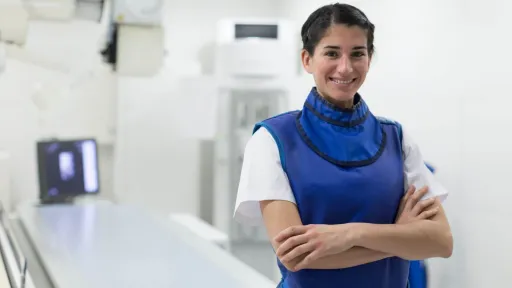
Related: Three Common Myths About Radiologic Technology
Educational institutions submit their programs for accreditation to ensure they meet the educational standards of accrediting bodies. When students enroll in an accredited program, they can feel confident its curricula will cover everything employers need them to know.
Applicants to study radiology should explore programs accredited by the Joint Review Committee on Education in Radiologic Technology. This is the only national accreditor for the fields of radiography, magnetic resonance, and radiation therapy recognized by the U.S. Department of Education. It's also earned recognition from the Council for Higher Education Accreditation.
Those interested in specialist areas of radiology may consider programs accredited by specialist accreditation agencies. For example, an aspiring nuclear medicine technologist may look for a quality program accredited by the Joint Review Committee on Educational Programs in Nuclear Medicine Technology. The Joint Committee on Education in Diagnostic Medical Sonography is another reputable accreditation agency that validates degree programs focused on diagnostic medical sonography.
Online and Hybrid Programs
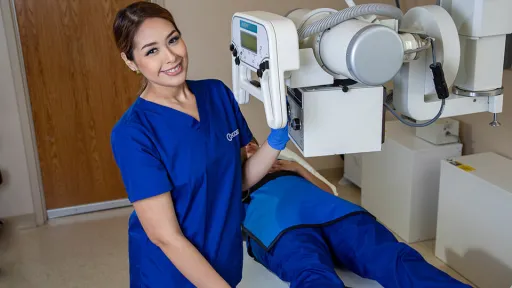
Several accredited educational institutions offer online or hybrid radiology degrees at the associate, bachelor's, and master's levels. Most courses have at least some onsite requirements for supervised radiologic technologist training and internship components. During these in-person classes, students may benefit from having instructors guide them through practical exercises, such as positioning patients and operating radiology equipment.
Online programs give students the freedom to study when it suits them best, so they're ideal for those studying while working, caring for children, or fulfilling other responsibilities. They can attend live-streamed lectures or watch the recorded playback when it's convenient. Since students completing online lessons create their own study schedules, online programs may appeal to self-motivated people who prefer independent learning.
Hybrid programs offer the benefits of online education and in-person learning. Classroom instruction often suits practical lessons, as educators can demonstrate procedures and provide instant feedback. Students can then adjust their approach and improve their techniques in real time. In the classroom, students can also use specialized radiological equipment they'll operate during their careers. Following graduation, they may apply to join healthcare teams. Students develop the collaboration skills they'll use in these teams through a hybrid program's face-to-face lessons. They may also build professional relationships that can help them advance in their careers.
Related: How to Become a Radiology Tech
Continuing Education and Advanced Degrees
Continuing education is a requirement for maintaining certification through official bodies. ARRT requires candidates to satisfy continuing education requirements every two years and continuing qualifications requirements every 10 years to maintain their certification. Those with ARMRIT certification must complete at least 24 continuing MRI-focused medical education credits every three years. Uncertified professionals can also benefit from continuing education to ensure they stay current with new technological developments, techniques, and best practices in radiology.
There are many opportunities to participate in continuing education, including:
- Participating in independent study of approved programs
- Viewing lectures
- Completing relevant academic courses
- Completing advanced CPR training
- Publishing an article in an approved peer-reviewed medical journal
Completing one or more radiology degrees can provide candidates access to several potential careers in this field. Start your journey toward a career in radiology by learning about studying for an Associate Degree in Radiologic Technology at Concorde Career College. This course gives you the opportunity to prepare for a career in radiologic technology in as little as 20 months. Take the next step on your healthcare career path with Concorde today.
"U.S. Diagnostic Imaging Services Market Size, Share & COVID-19 Impact Analysis, By Procedure (CT, MRI, X-Ray, Ultrasound, and Others), By Application (Cardiology, Neurology, Oncology, Orthopedics, Gynecology, and Others), By Payor (Public Health Insurance and Private Health Insurance/Out of Pocket), and By Setting (Hospitals, Imaging Centers, and Others), 2023-2030," Fortune Business Insights, https://www.fortunebusinessinsights.com/u-s-diagnostic-imaging-services-market-106552
"What is a Radiographer? What is a Radiologist?," HealthDirect, https://www.healthdirect.gov.au/what-is-a-radiographer-what-is-a-radiologist
"Radiologic and MRI Technologists," U.S. Bureau of Labor Statistics, https://www.bls.gov/ooh/healthcare/radiologic-technologists.htm
"Occupational Employment and Wage Statistics," U.S. Bureau of Labor Statistics, https://www.bls.gov/oes/current/oes291224.htm
"Radiologists' $427K Salary Places Specialty in Top 5, Though COVID May Take a Bite," Radiology Business, https://radiologybusiness.com/topics/radiologist-salary/radiologist-salary-medscape-physician-pay-covid-19
"Bachelor's in Radiology Technology Program Guide," BestColleges, https://www.bestcolleges.com/healthcare/bachelors/radiology-technology/program-guide/
"Where To Complete An Online Radiology Tech Program In 2024," Forbes Advisor, https://www.forbes.com/advisor/education/healthcare/best-online-radiologic-technology-program/
"How Long Does It Take to Become a Radiology Technician?," W Radiology, https://w-radiology.com/how-long-does-it-take-to-become-a-radiology-technician/
"About Us," American Registry of Radiological Technologists, https://www.arrt.org/pages/about/about-us
"Education Requirements — Primary Eligibility Pathway," American Registry of Radiological Technologists, https://www.arrt.org/pages/earn-arrt-credentials/initial-requirements/primary-requirements/education-requirements-primary
"What Can I Do with an Associate's Degree in Radiologic Sciences?" Learn.org, https://learn.org/articles/What_Can_I_Do_with_an_Associates_Degree_or_Certificate_in_Radiologic_Sciences.html
"Education Options for Radiology Technologists," All Allied Health Schools, https://www.allalliedhealthschools.com/radiology-technician/training/
"Radiologic Technology Associate Degree Program," Concorde, https://www.concorde.edu/diagnostic-programs/radiologic-technology
"Types of Radiology Degree," Radiology Training Programs, https://www.radiologytrainingprograms.com/types-of-radiology-degrees.html
"How to Become A Radiologic Technologist: A Step-By-Step Guide," Forbes Advisor, https://www.forbes.com/advisor/education/healthcare/become-a-radiologist-technician/
"15 Best Online Bachelor's Degrees in Radiology," Best College Reviews, https://www.bestcollegereviews.org/top/online-bachelors-degrees-in-radiology/
"How Long Does it Take to Get a Masters Degree in Radiology?", BestAccreditedColleges, https://bestaccreditedcolleges.org/articles/careers-and-education/how-long-does-it-take-to-get-a-masters-degree-in-radiology.html
"Ethics Requirements," American Registry of Radiologic Technologists, https://www.arrt.org/pages/earn-arrt-credentials/initial-requirements/ethics/ethics-requirements
"Magnetic Resonance Imaging Technologist (MRI) Examination-New Version Candidate Handbook," American Registry of Magnetic Resonance Imaging Technologists, https://www.armrit.org/pdf/APP4152024.pdf
"The ARRT Exam," American Registery of Radiologic Technologists, https://www.arrt.org/pages/earn-arrt-credentials/initial-requirements/exam/examination-requirement
"Maintaining Your Certification and Registration," American Registry of Radiologic Technologists, https://www.arrt.org/pages/earn-arrt-credentials/ongoing-requirements
"Joint Review Committee on Education in Radiologic Technology," Joint Review Committee on Education in Radiologic Technology, https://www.jrcert.org/
"About Accreditation," Joint Review Committee on Educational Programs in Nuclear Medicine Technology, https://www.jrcnmt.org/about-accreditation/
"Company & Mission," Joint Committee on Education in Diagnostic Medical Sonography, https://www.jrcdms.org/mission.htm#gsc.tab=0
"Online Master's Degrees in Medical Imaging, StudyPortals Masters, https://www.mastersportal.com/search/master/online/medical-imaging
"How to Become a Radiology Tech with an Online Radiology Degree," GetEducated, https://www.geteducated.com/career-center/how-to-become-a-radiologic-technologist/
"What Are the Benefits of Classroom Based Learning?", Industry Skills Training, https://ist.edu.au/resources/what-are-the-benefits-of-classroom-based-learning/
"Find Continuing Education Activities, American Registry of Radiologic Technologists, https://apps.arrt.org/FindCE/listing.aspx
"Biennial CE Requirements," American Registry of Radiologic Technologists, https://www.arrt.org/pages/resources/maintaining-credentials/continuing-education
"Studying Medicine in the USA," The Medic Portal, https://www.themedicportal.com/application-guide/studying-medicine-in-the-usa/
"How to Become a Radiologist: Steps to Take From High School," CollegeVine, https://blog.collegevine.com/how-to-become-a-radiologist
Take The Next Step Towards a Brighter Future
Interested in learning more about our Radiologic Technology program?
We have a Concorde representative ready to talk about what matters most to you. Get answers about start dates, curriculum, financial aid, scholarships and more!

